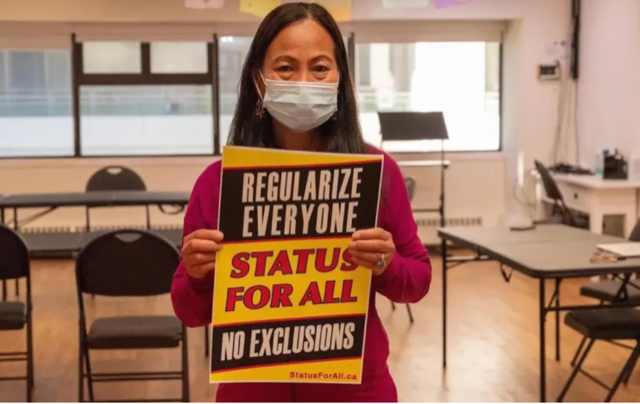
By Nicholas Keung
Toronto Star
Rose Celest had always had the idea of visiting the scenic Rideau Canal and seeing the gothic architecture of the Parliament Buildings in Ottawa, but the Canadian capital just seemed out of reach for the Toronto woman.
During her 14 years in Canada – the last nine of them as an undocumented migrant – the former domestic worker’s travels have been limited to accompanying her employer’s family to their cottage in Collingwood and to her hometown of Montreal.
Celest avoids leaving her tiny apartment except for work to avoid any contact with authorities – and possible deportation to her native Philippines.
So it was a big step for her to register for a town hall meeting with Canadian politicians to advocate for a so-called “regularization plan” that would give her and about 500,000 undocumented migrants a path to permanent residence so they could get out out of the shadows and have a life.
“I’m scared but excited and glad I can go. I want them to listen to us and know our suffering,” said Celest, 60, who came here in 2009 but was not granted status in 2013 after her work permit expired. “It’s not just me. There are many of us and we have to speak up.”
The federal government has developed a regularization plan – one of Prime Minister Justin Trudeau’s mandates for Immigration Secretary Sean Fraser since December – to tackle the problem of undocumented workers in precarious and exploitative jobs and to tackle a shadow economy.
City Hall at an undisclosed location in Ottawa, slated for Monday, is a final push to rally lawmakers to push for an “unrestricted and inclusive” plan that can benefit so many of those who are falling through the cracks and status in the Lost complex and at times disjointed immigration system.
“These people live in incredible desperation. Every day of delay means bosses are abusing you. You may be facing domestic violence. A landlord overwhelms you. Your children are being turned away from school. You can’t put food on the table and you’re being hunted down by the police and immigration officers,” said Syed Hussan of the Migrant Rights Network, who organized the town hall meeting and raised funds for the workers’ Ottawa trip.
“Some of them have active deportation orders against them and they will speak to the immigration minister and other politicians. This is an incredibly bold and courageous thing for her. It is a matter of great urgency.”
About 100 undocumented migrants from across Canada will drive, fly or take chartered buses to Ottawa, where they will meet with Fraser, Cabinet members and other MPs.
Many of the undocumented migrants work in construction, cleaning, nursing, food preparation and agriculture. Some are rejected asylum seekers, while others have entered legally as visitors, international students and temporary foreign workers but have overstayed; many have been here for years and contribute to Canada’s informal economy.
Celest, an active member of Toronto’s migrant labor movement for the past few years, said her life has been consumed by her immigration concerns, which leave her stressed, depressed and sleepless.
“It’s hard not to think about my status all the time. I get scared every time I leave my home, but I have to work to support my family,” said Celest, who last saw her two sons, now 36 and 24, in 2011 when she went home for a visit returned.
She could have applied for permanent residency at the time after meeting the minimum requirements for a two-year job, but she didn’t because she was too preoccupied with the breakdown of her marriage from being away from her family for so long. She missed the window to apply.
Nevertheless, she had to stay because the job prospects in the Philippines were so bad and she still had two sons and seven siblings to feed at home.
With no other permanent residency options, Celest said her spirits lifted when she first learned earlier this year that the Liberal government intended to work on a plan to regularize undocumented workers.
“This gives us hope and hopefully we won’t be disappointed,” said Celest, who has a bachelor’s degree in science and was an elementary school teacher in her home country before leaving to take care of others’ families.
Finding the courage to speak out about his lack of status is difficult for Romeo Tokpah, so he had to sit down and consider the invitation to City Hall before lobbying for the event.
The 34-year-old arrived in Canada as an asylum seeker from Liberia via the United States in 2017 and has worked two full-time jobs as a nurse and forklift driver in a warehouse – showering and sleeping between jobs – to support three orphaned siblings back home.
In December 2020, Tokpah was thrilled when Ottawa launched the time-limited Guardian Angels program to reward asylum seekers working on the frontline of healthcare during the pandemic with permanent residency. However, the restrictive requirements made him ineligible; His refugee application was rejected last year and subsequent appeals have failed.
“We are all afraid that we will be disappointed again. For many of us, going to Ottawa is the hardest decision,” he said. “But it would be a dream come true if we could all get our permanent status in Canada. That is our only hope.”
As a member of several local migrant advocacy groups, Tokpah regularly meets with other undocumented workers to plan and plan the trip to Ottawa. Special safety precautions have been put in place to protect participants from the risk of arrest by the authorities with the support of lawyers, barristers and social workers on board.
“We are nervous, but this is too important for all of us and we want to have a say in what this regularization program should look like,” he said. “We have many questions. We want to know if it’s safe for us to work, if we’re finally reuniting with our families, and when the plan comes.”
Danilo De Leon, a participant from Edmonton, was already on the authorities’ radar, having had to report in person to the Canada Border Services Agency every other Wednesday and twice a week by phone since 2017. Canada has renewed his work permit annually but has refused to grant him temporary residency status, leaving him in limbo and deprived of health care and other government services.
As a truck driver, the biggest challenge was getting time off work to make the journey. He wouldn’t be able to do it if his boss didn’t step in at the last minute and offer to work two shifts.
De Leon began his activism shortly after arriving from the Philippines in 2009 as a janitor on the temporary foreign workers program. He organized a campaign to form a union at his workplace and later founded Migrante Alberta to campaign for migrant rights in the province.
“The thing is, because we’re undocumented, we’re exposed to abuse from employers, (job)recruiters, consultants and immigration lawyers,” said the 51-year-old father of two girls, who he hasn’t seen in almost a decade .
“Were works. We pay taxes. We contribute to Canada. We are not a liability to Canada even if we lose our status,” he added. “The abuse must stop.”
Abu Hena Mostofa Kamal can’t wait to make the 16-hour drive from Thunder Bay to be heard in Ottawa and is grateful for the support of the local community – two of his Canadian friends are taking time off to drive him there.
The 22-year-old, a former international student from Bangladesh, had to drop out of Lakehead University in 2020 when his family could no longer support him due to the economic downturn caused by the pandemic.
Last year, when his study permit was rapidly expiring, he was able to apply for permanent residency under a special route introduced for international college graduates and migrant workers who have accumulated at least 1,560 hours of work in certain essential occupations.
While waiting for his permanent residence application to be processed amid a massive immigration backlog, Kamal lost his status. In May he was summoned by border officials and issued with an expulsion order for exceeding his study permit.
“We’ve lived in the tentative for so long and we hope our politicians will do the right thing and get everyone involved in the plan,” said Kamal, who since arriving in Thunder Bay has launched local programs to welcome international students and snow for Shovel seniors in 2018. He has also volunteered at a homeless shelter and soup kitchen.
“We are excited to consider the possibility of reuniting our family, having our basic rights and not living in constant fear of being removed. We just want to live a normal life and move forward.”
Nicholas Keung is a Toronto-based reporter who covers immigration for the Star. Follow him on Twitter: @nkeungSHARE:
